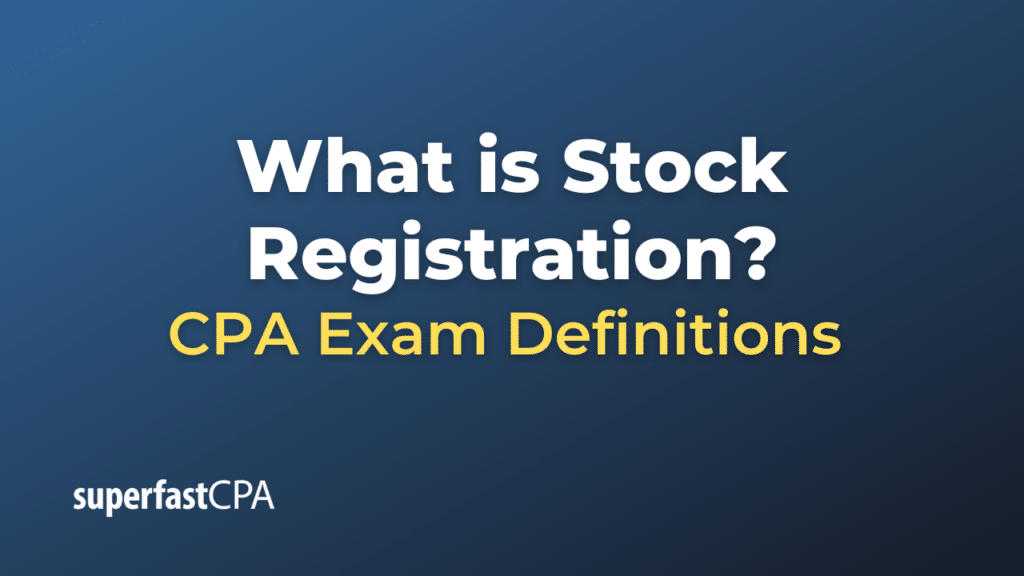Stock Registration
Stock registration refers to the process by which securities, such as stocks, bonds, or other financial instruments, are registered in the name of the actual owner or in the name of a nominee. This registration ensures that the ownership of the securities is properly recorded and that the rights of the security holder (e.g., dividends for stockholders) are protected. Stock registration can be done in two primary ways:
- Direct Registration: In this method, securities are registered and held directly in the name of the owner, without the use of a physical certificate. Instead, the issuing company, through its transfer agent, maintains electronic records of ownership. Owners receive a statement of holdings and any relevant transaction details, such as dividends paid or shares sold. This method allows for easier and faster transfers and transactions since there are no physical certificates to handle.
- Street Name Registration: When an investor buys a security through a brokerage firm, it’s often registered in the name of the brokerage firm, or another nominee, rather than the name of the individual investor. This is called holding the security in “street name.” While the brokerage firm is listed as the holder of the security, the real or “beneficial” owner is the individual investor. Holding securities in street name simplifies the trading process because the securities don’t need to be physically delivered or registered each time they are sold. The brokerage firm keeps track of the beneficial owner’s interest, credits any dividends or interest, and provides the beneficial owner with the right to vote the securities.
The method of registration chosen can affect how dividends are received, how securities are transferred, how proxy materials are received, and how lost or stolen securities are replaced. It’s essential for investors to understand the implications of each registration method and choose the one that best suits their needs.
Example of Stock Registration
Let’s walk through a hypothetical example of stock registration to illustrate the two primary methods: Direct Registration and Street Name Registration.
Example:
Scenario: Jane Smith decides to invest in shares of TechGiant Inc., a popular technology company. She can choose to register the stocks in one of two ways:
- Direct Registration:
- Jane opens an account directly with TechGiant Inc. or with its designated transfer agent.
- She buys 100 shares of TechGiant Inc.
- The shares are registered directly in her name, meaning Jane is the recorded owner of these shares according to TechGiant Inc.’s records.
- Jane does not receive a physical stock certificate. Instead, she receives an electronic statement (similar to a bank statement) that shows she owns 100 shares of TechGiant Inc.
- When dividends are paid by TechGiant Inc., they are directly deposited into her account or sent to her as a check.
- If Jane wants to sell her shares, she will have to work with the transfer agent or convert her shares to street name registration through a broker to trade them more rapidly.
- Street Name Registration:
- Jane opens an account with BrokerageXYZ, a financial brokerage firm.
- Through BrokerageXYZ, she buys 100 shares of TechGiant Inc.
- The shares are registered in the name of BrokerageXYZ, not directly under Jane’s name. This means that, on the official books of TechGiant Inc., BrokerageXYZ is the recorded owner of those shares.
- However, within BrokerageXYZ’s internal records, Jane is listed as the beneficial owner of the 100 shares.
- Whenever TechGiant Inc. pays dividends, the funds are sent to BrokerageXYZ, which then credits Jane’s brokerage account with her share of the dividends.
- If Jane wants to sell her shares, she can easily do so through BrokerageXYZ without having to transfer ownership first.
Decision: Jane chooses to go with Street Name Registration because she plans to trade frequently and wants the flexibility offered by a brokerage account. While she is not the “recorded owner” of the shares on TechGiant Inc.’s official books, she retains all the rights and benefits of ownership through her broker, BrokerageXYZ.













